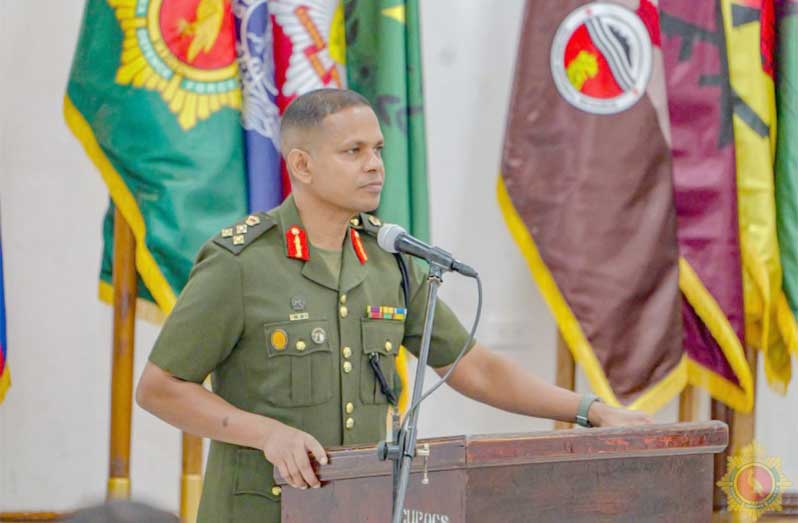—GDF Chief, says Essequibo claims more ‘political theatre’, than military threat, as Guyana balances compassion with security
THE Guyana Defence Force is managing the influx of Venezuelan migrants with a multi-agency approach, balancing compassion and security.
This is according to Chief of Defence Staff, Brigadier Omar Khan, who, during a Tuesday broadcast of a new programme “Safeguarding the Nation” noted that strong measures are implemented to ensure that Venezuelan migrants entering Guyana are intercepted, screened and documented.
“In the execution of my duties and my visits to border communities, I have personally witnessed Venezuelan migrants and the embarrassment, the shame, the almost loss of dignity of families, women, children, babies, fathers, seeking refuge in a foreign land,” the Army Chief said.
In recent years, Guyana has seen an influx of migrants fleeing Venezuela due to the political and economic crisis.
“Guyana, [is] receiving thousands of Venezuelan migrants, but countries like Colombia and Brazil, they are in the millions. It tells about the political and socio-economic conditions in Venezuela.”
“This is disheartening, but while Guyana is approaching this with compassion, we are committed to safe borders,” Khan stressed.
Guyana’s multipronged approach sees collaboration among the ministry of health, the local police, and other regional and government authorities.
“We have implemented strong security measures on vetting, processing, documenting all Venezuelan migrants. And this is another example in which not only the Guyana Defence Force is involved, but as a multi-agency approach, again, the police force, the Ministry of Health, the local government authorities, the regional authorities, everyone is on board whenever we have the interception of Venezuelan migrants.”
BORDER CONTROVERSY: POLITICAL THEATRE RATHER THAN MILITARY
Meanwhile, responding to questions on the ongoing border controversy, Brigadier Khan noted that the Guyana Defence Force (GDF) remains resolute in protecting Guyana’s border.
He explained that the GDF continues to be cautious and is operating within its defence strategy, Diplomacy, Information, Military, and Economic (DIME).
He remarked that Venezuela’s continued assertion of sovereignty over Guyana’s Essequibo region is better characterised as political maneuvering than a military threat.
Nevertheless, the GDF, remains cognisant and investments are being made in ‘smart’ technology not only to secure the country’s borders but promote safety country wide.
“We are operating on the military strategy to build, deploy and operate a smart, modern and resilient force, not only to defend Guyana, but also to contribute to economic development.”
Recently, Venezuela had failed at its attempt to host elections over Guyana’s Essequibo region.
The Nicolás Maduro administration had held a national vote in May to support illegal claims over Essequibo, on Guyana’s 59TH Independence anniversary despite the matter being before the International Court of Justice (ICJ), which has cautioned Venezuela against taking any unilateral actions that would alter the status quo.
There were no reports of unauthorised activities in bordering communities across the country.
On May 1, 2025, the ICJ ordered the Bolivarian Republic of Venezuela to refrain from holding or preparing for any elections in Guyana’s Essequibo region, pending a final ruling on the ongoing border controversy.
The decision comes in response to a request by Guyana following Venezuela’s January 2025 announcement of plans to elect a governor and legislative council for what it claims to be the “Guayana Esequiba State.”
In its ruling, the World Court reaffirmed the provisional measures granted on December 1, 2023, and introduced a new, binding directive.
The court in its December 1, 2023 order, stated: “Pending a final decision in the case, the Bolivarian Republic of Venezuela shall refrain from taking any action which would modify the situation that currently prevails in the territory in dispute for which the Cooperative Republic of Guyana administers and exercises control over that area; and both parties shall refrain from any action which might aggravate or extend the dispute before the court or make it more difficult to resolve.”
The border controversy between Guyana and Venezuela was settled by the 1899 Arbitral Agreement.
However, during the early 1960s, Venezuela’s claims to the Essequibo region resurged, and the country threatened physical invasion.
Guyana has maintained that its terrestrial boundary is 83,000 square miles, in addition to the internationally known maritime allocation.
“Military conflict is not in anyone’s interest. The claim by Venezuela is political and should remain there, and the process at the ICJ should be followed,” the Chief of Defence Staff reminded.
